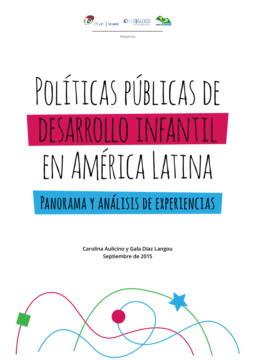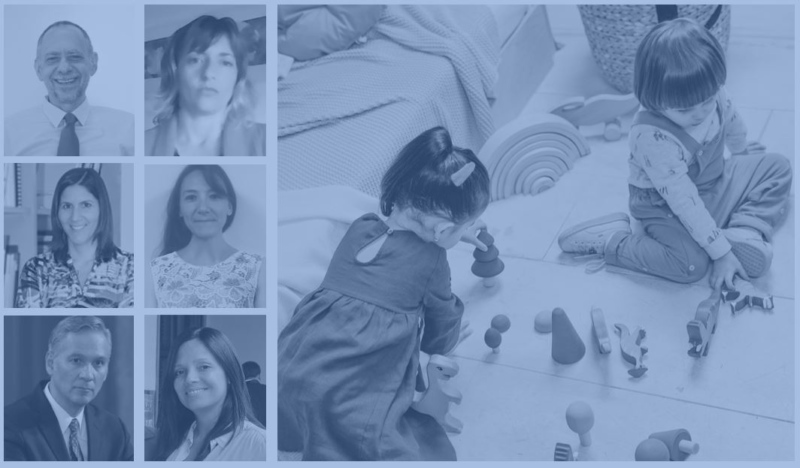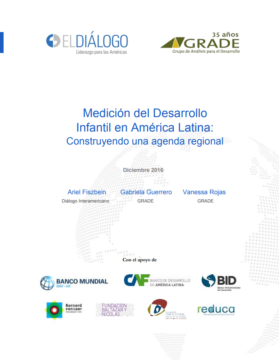
An Agenda for Early Childhood Development
Early childhood development is one of the investments with the highest returns and allows us to achieve, simultaneously, equity and efficiency objectives.
This post is also available in: Español
On December 9, 2020, the Regional Network for Measuring Early Childhood Development (REMDI), together with the Inter-American Dialogue and the UNICEF Regional Office, convened a webinar to present the report "Measuring the Impact of Covid-19 on Children under Six in Latin America: Mapping Surveys in Progress and Systematizing Lessons Learned" authored by Gabriela Guerrero (GRADE). This report brings together efforts across Latin American and Caribbean countries to measure the impact of the pandemic on early childhood.
This webinar featured Gabriela Guerrero, senior researcher at the Grupo de Análisis para el Desarrollo (GRADE); Claudia Zamora, national director of the educational program Chile Crece Contigo at the Ministry of Social Development; and Ricardo Bucio, executive secretary of Mexico's National System for the Integral Protection of Children and Adolescents (SIPINNA). Ariel Fiszbein, director of the Education Program of the Inter-American Dialogue, and Giorgina Garibotto, coordinator of REMDI’s technical secretariat and director of the Knowledge Management and Generation Division of Uruguay Crece Contigo MIDES at the Ministry of Social Development, welcomed the participants. The seminar was moderated by Monica Rubio, regional social policy advisor for UNICEF LACRO. The event had 126 attendees from various countries in the region.
In this new pandemic context, childhood development in Latin America and the Caribbean has been particularly affected. Social isolation, limited access to services, and closures of education and childcare centers have presented challenges for millions of children in the region. Therefore, it is imperative to promote spaces for the discussion of challenges and lessons learned regarding the creation and implementation of surveys to assess the well-being and development of children during the pandemic. This will allow the identification of opportunities and challenges for the development of efficient public policies based on evidence to address and improve early childhood development and service delivery systems during the pandemic and beyond.
Gabriela Guerrero presented the main goals of the report regarding ongoing surveys in Latin America. Through this initial mapping, she seeks to identify common themes and interests among the surveys implemented in different countries in order to analyze strengths and challenges in the design and adaptation of this kind of measurement tool, particularly during a context of social distancing.
Guerrero identified the criteria used to choose the surveys analyzed. First, the surveys measure the impact of the pandemic on children under 6 years of age and include information on how the pandemic has affected access to and use of early childhood services and programs. In addition, they measure some dimension of childhood development and collect information from households with children under 6 years of age through national and/or local remote surveys. This report was developed through information provided by early childhood experts in the public, private and civil society sectors on the surveys implemented in the region. Those responsible for the design and implementation of these surveys were interviewed in order to expand and gather more and better information about each study. The mapping of surveys was done in the two-month period August-October 2020 and identified ten ongoing surveys in Latin America, of which six were by telephone and four online. Twenty-six professionals involved in the design and implementation of the surveys were interviewed.
After outlining the report's objectives and methodology, Guerrero presented the main findings of the measurement mapping. First, Guerrero established that the telephone survey is the most solid option from a methodological point of view. Because information must be collected remotely, telephone surveys can take a more representative sample of households with children nationwide. With respect to online surveys, their scope may have limitations such as lack of connectivity and access to devices. In some contexts, a representation bias emerges in online surveys due to the exclusion of rural areas and vulnerable communities. In addition, the media utilized to disseminate the surveys biases the final sample composition, since these outlets don’t reach the majority of the population. However, online surveys help to collect as much information as possible in a time-constrained environment.
Second, Guerrero highlighted the usefulness of relying on previously implemented surveys since they incorporate a sampling frame, already formulated questions, and comparability with previous survey results. Likewise, incorporating international instruments implemented in other countries opens up the possibility of making regional comparisons. According to Guerrero, the report confirmed that only two out of ten surveys measured any dimension of socio-emotional childhood development. Five other surveys included questions about children's emotional well-being, such as changes in mood and behavior. In some surveys, it was found that internationally recognized instruments, such as the Child Behavior Checklist (CBCL), were adapted to survey this dimension. However, no surveys were found that have made visible other aspects of early childhood development, such as the cognitive and linguistic dimension, due to the difficulties in capturing them in large-scale telephone or online surveys. Another finding Guerrero shared was the increase in reported incidents of gender and child violence in the home. Despite the enormous challenge that this situation poses, nine out of ten surveys considered it necessary to collect information on the subject. The use of physical punishment; increased tensions and conflicts between household members; and situations of domestic violence including violence against children were recorded.
It was revealed that only five of ten surveys mapped specifically focused on children under 6, while only one of them collected information at the national level. Finally, Guerrero stressed that while the survey is an important tool, it's not the ultimate goal. It's essential to have a plan for the use of the information from the initial design of the survey, seeking to involve potential users of the information, especially those in the public sector.
In response to Gabriela Guerrero's presentation, Claudia Zamora presented the Chilean experience. Zamora stressed that children have not been prioritized during the pandemic, as they were not considered a group at risk from the virus. In addition, she pointed out the importance of defining baselines and frameworks for comparison before, during, and after the pandemic when referring to the "impact" of Covid-19 on childhood development. She also spoke of how essential it is to identify the groups of children already experiencing the greatest challenges, because it is not known whether previously vulnerable children are the most affected or whether there is another group more affected by the pandemic.
Zamora cautioned about the risks of attributing causality to information gained from surveys. While most surveys emphasized the negative effects of the pandemic such as food security or inequity of referral in care, Zamora also shared how positive effects on early childhood development have been identified during the pandemic. Some of these positive effects include a lower rate of breastfeeding interruption, improvements in building secure attachment, positive emotional reactions, among others. In addition, Zamora noted that in specific groups, especially children with different abilities or victims of bullying, benefits have been identified from staying at home, since before the pandemic they faced difficulties in in-person settings only. Now that they can be at home, in several cases, their stress levels and symptoms have decreased. Zamora concluded with a call to use the information obtained in the medium and long-term through effective linkages with decision-makers and an active strategy that allows its dissemination to strengthen mechanisms of protection, promotion, and early childhood development in the region.
Ricardo Bucio assured that the greatest challenge for children has not been the Covid-19 crisis itself, but the invisibility they have experienced as a group by not being prioritized as victims of the pandemic. Also, he highlighted the need to evaluate the impact of confinement in the family environment, since currently the family units represent the main space of care for millions of children in the region. Bucio called for greater participation of parents in care policies, since there must be a link between public and private institutions and families to ensure a comprehensive childhood development. In addition, he spoke about how parents and caregivers are currently active participants and have a greater understanding of what happens to children in the home, which can be used to deepen interventions that have greater and better relationships between educational institutions and families.
Bucio spoke about three studies in Mexico: 1) a study that surveyed 1,500 households where children between the ages of 0 and 5 live; 2) a longitudinal survey conducted by the Universidad Iberoamericana that collected information on the mental and emotional health of caregivers in 1,000 households; and 3) a participation exercise for children and adolescents between the ages of 3 and 17, in which 578,000 children and adolescents participated. Based on these studies, Bucio stressed that eight out of ten respondents reported that their primary caregiver was their mother, who supports them with homework, accompanies them in play, and dialogues directly. Also, he commented on the increased use of smartphones and devices in Mexico, as well as the prevalence of domestic violence incidents, and the high rates of anxiety reported by parents and caregivers with children in early childhood. To conclude his presentation, Bucio assured that the pandemic will generate a greater impact on the early childhood population, since CONEVAL indicators show that young children will be the most affected. He pointed out that 13.3 million children under the age of six who may be particularly affected by the devastation of the pandemic, which is why quality measurements instruments are needed to make this group visible in decision making and produce significant interventions, such as greater access and coverage in the care system.
The event concluded with an acknowledgement by all panelists of the various challenges and opportunities that the pandemic has created for childhood development. All experts emphasized the importance of continuing efforts to measure these effects in a direct, practical, and comprehensive manner.
Early childhood development is one of the investments with the highest returns and allows us to achieve, simultaneously, equity and efficiency objectives.
Measuring early childhood development (ECD) at the national level is crucial for informing policy-making and for evaluating ECD programs in Latin America.
La importancia de los primeros años de vida sobre la formación del capital humano es ampliamente reconocida. ¿Cómo podemos asegurar una oferta de servicios de calidad?
 Cottonbro / Pexels/ CCO
Cottonbro / Pexels/ CCO

